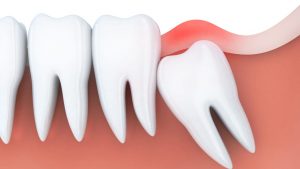 Impacted teeth are the teeth that fail to erupt and remain in the jawbone since they do not have enough room to erupt or develop normally in the tooth order. While some teeth remain impacted in the jawbone, some teeth may also be invisible due to soft tissue on them. The most common causes of impacted tooth problems that occur due to many different factors are genetic factors, lack of sufficient row and room for tooth alignment due to narrow jaw, failure of the tooth to erupt due to blockage resulting from displacement of the neighboring teeth and dental inflammation.
Impacted teeth are the teeth that fail to erupt and remain in the jawbone since they do not have enough room to erupt or develop normally in the tooth order. While some teeth remain impacted in the jawbone, some teeth may also be invisible due to soft tissue on them. The most common causes of impacted tooth problems that occur due to many different factors are genetic factors, lack of sufficient row and room for tooth alignment due to narrow jaw, failure of the tooth to erupt due to blockage resulting from displacement of the neighboring teeth and dental inflammation.
Such teeth may be completely impacted in the jawbone or some of them may have partially erupted. The teeth that are partially erupted and partially remain impacted in the jaw are called semi-impacted (or partially impacted) teeth. Although the impacted tooth problem may occur in any tooth in the mouth, it is mostly seen in 20-year-old teeth (as they are the last ones to erupt).
The treatment recommended for impacted tooth is extraction surgery. In this operation, the area is made numb with local anesthetic, then an incision is made in the gum tissue around the tooth and the embedded tooth is removed. After the impacted tooth is removed, the operation is completed by closing the wound with stitches. It is a very comfortable procedure for the patients as the area is under anesthesia during the entire procedure. Patients do not feel any pain.
The operation is not the last stage in the treatment of impacted teeth. There is a short treatment period after the operation. Sutures applied during surgery stay in place for 7 to 10 days before removal. Antibiotics and analgesics are given to the patient after the operation, if necessary. Since the appropriate surgical intervention is important within the scope of an operation, the dentist who will perform the impacted tooth operation should be competent and experienced in this field.
Although dental surgeries are usually considered as minor procedures, it is an operation and should be performed carefully and meticulously, just like the surgeries for other parts of the body. Therefore, the dentist must be informed about the medicines taken by the patient during planning and general examination.

